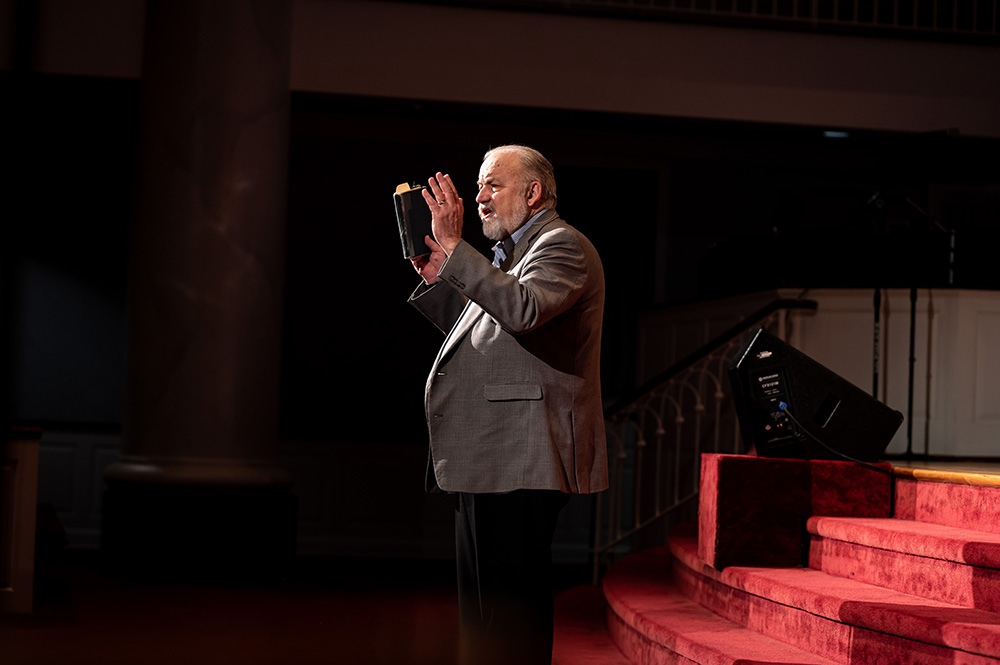
Defend, the annual, week-long apologetics conference at New Orleans Baptist Theological Seminary and Leavell College, featured top apologetics speakers on crucial questions raised by those inside and outside the church, Jan. 3-7.
"Christians desperately need apologetics in a culture like ours, a post-Christian culture that is rapidly becoming an anti-Christian culture,” said Robert Stewart, director of Defend and the NOBTS apologetics program.
Stewart pointed to a shifting culture that now questions the integrity and goodness of the Christian faith.
"When I was in college, the operative question was 'Is Christianity true?' When I was in graduate school, the question was 'Is Christianity relevant?' That question reflected a post-Christian perspective,” Stewart said. “Today, the preeminent question is this: 'Is Christianity good?' This question reveals an increasingly anti-Christian mood. Today's apologist must be able to defend the truthfulness, relevance, and goodness of the Gospel."
Plenary speakers included renowned resurrection scholar Gary Habermas; Lisa Fields, founder and director of Jude 3 Project; Michael Strauss, University of Oklahoma particle physicist and CERN laboratory physicist, Geneva, Switzerland; David Calhoun, Gonzaga University philosophy professor; Tim McGrew, author, speaker and University of Michigan philosophy professor, Craig Hazen, Biola University’s apologetics program founder and director; James Walker, president of Watchman Fellowship, a ministry to counter-Christian groups; Jamie Dew, NOBTS and Leavell College president, and others.
The 17 plenary sessions and the more than 100 breakout sessions focused on the interaction of science and faith, responding to objections to the faith, biblical responses to hot-topic social issues, worldview questions and engaging world religions, arguments for God’s existence and other philosophy topics, biblical responses to gender and sexuality questions, and other issues.
Conference attendees included individuals from all walks of life, and church and collegiate groups from as far away as California, Kentucky, Wisconsin, and Pennsylvania.
“Defend helps me to articulate my faith to both believers and non-believers, especially in the public square,” said attendee Jay McCallum, Associate Justice of the Louisiana Supreme Court and member of First Baptist, Farmerville, Louisiana.
“Christianity is based on faith and supported by reason,” McCallum continued. “My Christian faith is the most logical part of my existence. I am so thankful that Louisiana Baptists support programs such as this that strengthen and enrich my faith.”
SCIENCE AND FAITH COMPATIBLE
Michael Strauss, whose research at the Large Hadron Collider at CERN is testing predictions of the Standard Model of elementary particles, a particle physicist conducting experimental research at CERN laboratory near Geneva, Switzerland, said scientific discoveries give evidence for God.
“What we learn from science is the best apologetic,” Strauss said. “Scientific discoveries give evangelistic apologetic evidence for the trustworthiness of God.”
Stauss, author of “The Creator Revealed: A Physicist Examines the Big Bang and the Bible,” pointed to four characteristics of the universe that give “evidence beyond a reasonable doubt” for God: the universe had a beginning; the universe is finely-tuned to within extreme, narrow parameters; the earth is rare in being well-suited for life; and the universe’s capacity to be described in mathematical language implies design by an intelligent and personal designer.
Science undergirds faith, Strauss said, adding, “Apologetics is not just for unbelievers. It’s for us, to strengthen our faith.”
THE RESURRECTION IS KEY
Gary Habermas, NOBTS visiting professor of apologetics and distinguished research professor at Liberty University’s Rawlings School of Divinity, is the author, co-author, or editor of more than 43 books, many on the resurrection.
Today, many critical scholars recognize that the resurrection is supported by “extremely early” eyewitness reports that reflect a “high Christology,” the view that Christ is uniquely divine, Habermas said.
New Testament creeds, such as 1 Corinthians 15:3-4, are recognized by even agnostic scholars to pre-date Paul’s conversion, providing evidence for the resurrection that dates to within three to five years of the empty tomb, Habermas explained.
“There’s nothing like this in any religion, in any time,” Habermas said, emphasizing the importance of the 1 Corinthians 15:3-4 creed.
While other questions, such as genocide or the problem of evil, are important to answer, the Christian faith hinges on the resurrection, Habermas explained. “If the resurrection is true, Christianity follows,” Habermas said.
APATHY, TODAY’S BIGGEST CHALLENGE
Kyle Beshears, author of “Apatheism: How We Share When They Don’t Care,” called the culture’s indifference to God – apatheism-- a greater challenge to evangelism today than atheism.
“’Apatheism’ is when a person believes God is irrelevant and feels apathetic toward Him,” Beshears said. “A comfortably distracted society robs people of their motivation to care about God.”
Beshears traced the roots of apatheism to secularism and pluralism and the idea that many options for belief about God are equal, leading to culture’s conclusion that God does not matter.
Beshears suggested challenging apatheists to consider what life would be like if the object, goal, or relationship that the apatheist values suddenly disappeared. The question can lead the apatheist to doubt his values and can open the door for fruitful conversation, Beshears said, adding that this approach can be more effective than an apologetic approach.
“Doubt is a type of thinking that is more powerful than mere objective thinking alone,” Beshears said. “Doubt motivates us to think about things we didn’t care about before.”
TO LEARN MORE
Begun in 2009, the Defend conference is held each January. Conference registrants receive recordings of all plenary and breakout sessions. Information is available at defendthefaith.net.
“The Defend conference is unique among apologetics conferences,” Stewart said. “Not only does it invite world-class speakers but it is five-days of instruction, which means that conference attendees have the opportunity to interact with speakers over meals shared in the seminary cafeteria and coffee shop.”